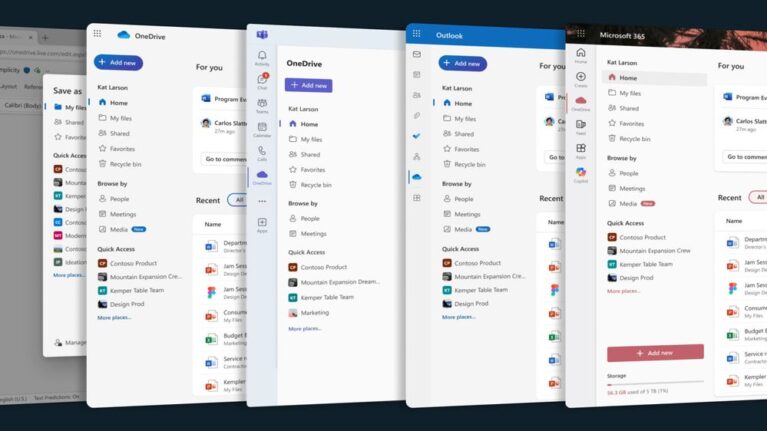
Yet, you may have started noticing limitations. Your apps are stuck on your desktop, limiting productivity anytime you’re away from your office. You can’t easily access your files or collaborate when working remotely or traveling, creating unnecessary friction for your team. Perhaps you’ve seen your company’s IT expenses creep upwards as you’ve added separate solutions for email, file storage, and virtual meetings.
If these challenges sound familiar, you might be considering upgrading to Microsoft 365
Microsoft 365 is a cloud-based subscription service that combines best-in-class productivity apps like Word, Excel, and PowerPoint with powerful collaboration, security, and AI-driven tools. With Microsoft 365, you keep the familiar apps your team already relies on, enhanced with the simplicity, flexibility, and security of the cloud.
Empower employees to work from anywhere, meet and chat easily using Microsoft Teams, and collaborate in real-time across documents and apps. Boost your team’s productivity with Copilot, your AI-powered assistant for work. Simplify IT and lower costs by consolidating email, storage, and productivity tools into one integrated solution while safeguarding your company’s data.
Now is the perfect time to move to Microsoft 365—and we’ve got the numbers to prove it
To examine the potential return on investment (ROI) companies realize by implementing Microsoft 365, Microsoft commissioned Forrester Consulting to conduct a study on The Total Economic Impact™ Of Microsoft 365 For Business1. The study highlights a substantial 223% ROI over three years, with a payback period of less than six months, proving that the initial investment is quickly recovered. Even more compelling, the study quantified over $500,000 in benefits over three years, driven by:
- Collaboration time savings of 1.5 hours weekly per user thanks to advanced communication tools, business automation, and process improvements.
- Enhanced IT specialist productivity, saving 686 hours annually by reducing help desks tickets and minimizing time spent on system updates and patching.
- Significant cost reductions, with over $297,000 in savings from retiring outdated hardware and software, along with lower IT maintenance costs.
The study also highlighted notable unquantified benefits, such as streamlined workflows through automation with Power Automate and improved decision-making with easy-to-use analytics in Power BI. These enhancements empower teams to reduce administrative overhead, focus on strategic tasks, and leverage data-driven insights, driving overall organizational efficiency and growth.
 Source: The Total Economic Impact™ Of Microsoft 365 For Business
Source: The Total Economic Impact™ Of Microsoft 365 For Business
Get more out of the tools you use every da
More flexibility. No longer are you limited to a single device; Microsoft 365 enables a user license to be used on up to five PCs, tablets, and mobile devices, empowering your team to stay productive wherever they work. Employees can even use their apps offline for up to 30 days, perfect for remote travel or locations with limited internet connectivity.
More productivity. Always have the latest features in apps like Word, Excel, PowerPoint, and Teams—no need to buy new versions. Collaborate in real time with document sharing and coauthoring, while 1TB of OneDrive storage keeps files secure and accessible across devices.
More security. Protect against phishing, malware, and spam with built-in security policies. Secure access with multi-factor authentication, single sign-on, and remote data wiping for lost or stolen devices. Safeguard business data while enabling AI-driven productivity with Microsoft Copilot.
Time is running out for older versions of Office—here’s what you need to know
If your business is still using Microsoft Office 2016 or Microsoft Office 2019, it is essential to plan your transition now. Support for these versions ends on October 14, 2025, after which Microsoft will no longer provide critical security updates or technical support. Continuing to use unsupported software can expose your organization to security vulnerabilities, compliance risks, and operational disruptions.
Migrating to Microsoft 365 in advance will help safeguard your business, enhance productivity, and simplify IT management. Proactively upgrading now can help you transition seamlessly and mitigate potential risks—don’t wait until the deadline approaches.
(Source: Microsoft)
Read more:
- Microsoft 365 Copilot drove up to 353% ROI for small and medium businesses—new study
- Microsoft Office Apps Soon Won’t Be Supported on Windows 10
- Microsoft will send legacy Outlook users to new version in 2026
Contact us for free and detailed advice














